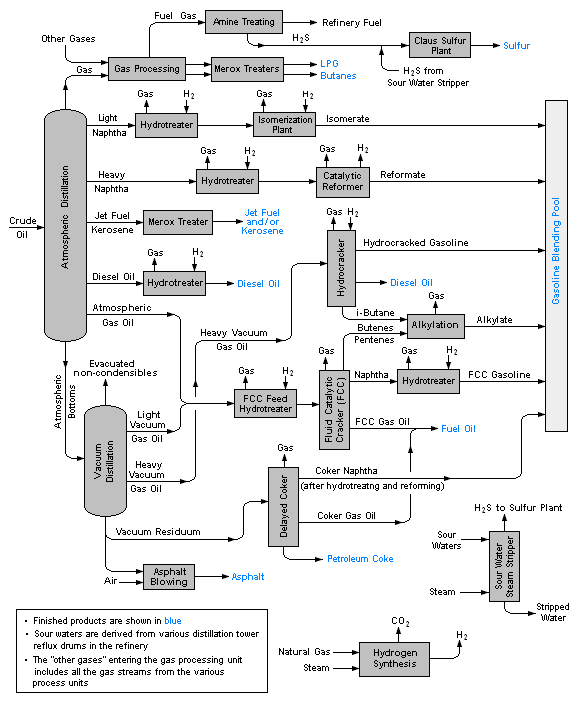gslack
Senior Member
- Mar 26, 2010
- 4,527
- 356
- 48
A lot of people associate petroleum with automobiles, coal with generating power, natural gas with heating, and so on and so forth. And rightly so, these things are indeed correct. But how many of us actually know what other things these fossil fuels provide us with? Some may know about a few other applications and things; many of you may know that oil refining brings us some plastics, kerosene and a few others, but most of our knowledge on it stops there...
Well lets take a look at it shall we? Following is a link to a brief from a wikki article on oil refining and a pic showing a small example of how it works.
Oil refinery - Wikipedia, the free encyclopedia

okay there you have a short example of base products, and a graphic on how its gotten from the oil. But what about direct products other than those we already know about? Other things we use directly which relies on petroleum-based or derived ingredients?
Well for this I will need a few more posts... The fact is petroleum is used in nearly any industry we can think of in some way. Either directly, such as Transportation of the product, or indirectly as in additives to another product, if you can name it petroleum is in it somehow.
A couple links to study on your own...
Petroleum - Wikipedia, the free encyclopedia
Petroleum, Economic Uses of: World of Earth Science
petroleum refining :: Petroleum products and their uses -- Britannica Online Encyclopedia
please take some time and educate yourself on this. Start with what I provided and/or look for yourself. Actually I really hope you do look for yourself and stay away from either left or right leaning media outlets or websites/blogs.
If you want to be an educated citizen who votes responsibly, you cannot take anyone's word for it any longer. you have to get your hands dirty and do some research. if you rely on the magic box to tell you or a one-sided or agenda driven source, you will get the government you deserve...
I will post more on this very soon....
Well lets take a look at it shall we? Following is a link to a brief from a wikki article on oil refining and a pic showing a small example of how it works.
Oil refinery - Wikipedia, the free encyclopedia
Specialty end products
These will blend various feedstocks, mix appropriate additives, provide short term storage, and prepare for bulk loading to trucks, barges, product ships, and railcars.
Gaseous fuels such as propane, stored and shipped in liquid form under pressure in specialized railcars to distributors.
Liquid fuels blending (producing automotive and aviation grades of gasoline, kerosene, various aviation turbine fuels, and diesel fuels, adding dyes, detergents, antiknock additives, oxygenates, and anti-fungal compounds as required). Shipped by barge, rail, and tanker ship. May be shipped regionally in dedicated pipelines to point consumers, particularly aviation jet fuel to major airports, or piped to distributors in multi-product pipelines using product separators called pipeline inspection gauges ("pigs").
Lubricants (produces light machine oils, motor oils, and greases, adding viscosity stabilizers as required), usually shipped in bulk to an offsite packaging plant.
Wax (paraffin), used in the packaging of frozen foods, among others. May be shipped in bulk to a site to prepare as packaged blocks.
Sulfur (or sulfuric acid), byproducts of sulfur removal from petroleum which may have up to a couple percent sulfur as organic sulfur-containing compounds. Sulfur and sulfuric acid are useful industrial materials. Sulfuric acid is usually prepared and shipped as the acid precursor oleum.
Bulk tar shipping for offsite unit packaging for use in tar-and-gravel roofing.
Asphalt unit. Prepares bulk asphalt for shipment.
Petroleum coke, used in specialty carbon products or as solid fuel.
Petrochemicals or petrochemical feedstocks, which are often sent to petrochemical plants for further processing in a variety of ways. The petrochemicals may be olefins or their precursors, or various types of aromatic petrochemicals.

okay there you have a short example of base products, and a graphic on how its gotten from the oil. But what about direct products other than those we already know about? Other things we use directly which relies on petroleum-based or derived ingredients?
Well for this I will need a few more posts... The fact is petroleum is used in nearly any industry we can think of in some way. Either directly, such as Transportation of the product, or indirectly as in additives to another product, if you can name it petroleum is in it somehow.
A couple links to study on your own...
Petroleum - Wikipedia, the free encyclopedia
Petroleum, Economic Uses of: World of Earth Science
petroleum refining :: Petroleum products and their uses -- Britannica Online Encyclopedia
please take some time and educate yourself on this. Start with what I provided and/or look for yourself. Actually I really hope you do look for yourself and stay away from either left or right leaning media outlets or websites/blogs.
If you want to be an educated citizen who votes responsibly, you cannot take anyone's word for it any longer. you have to get your hands dirty and do some research. if you rely on the magic box to tell you or a one-sided or agenda driven source, you will get the government you deserve...
I will post more on this very soon....

